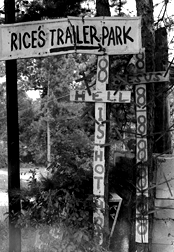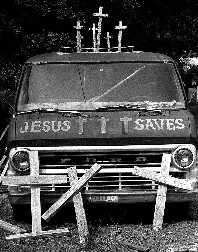 At the bend in the curve on a two-lane blacktop just outside Prattville, Ala., (about 15 miles north of Montgomery)
W.C. Rice's Crossgarden and Trailer Park looms like a sign of the apocalypse in a sinner's world gone to seed.
At the bend in the curve on a two-lane blacktop just outside Prattville, Ala., (about 15 miles north of Montgomery)
W.C. Rice's Crossgarden and Trailer Park looms like a sign of the apocalypse in a sinner's world gone to seed.
Crosses are everywhere -- and I do mean everywhere. They're painted on the side of abandoned stoves, tacked to the side of a makeshift chapel, stacked one upon the other like ladders to heaven and plastered on every truck and car in the yard.
"Thank You Jesus" is scrawled on the door of a wrecked clothes dryer. "Jesus Saves" promises a junked air-conditioner. "Hell Is Hot, Hot, Hot," proclaims a placard nailed to a scrub pine.
Try as I might, I lost count at 934 crosses. And I was just getting started.
Since his mother's funeral in 1976, Rice, a retired house painter, has dedicated virtually every waking moment to fervently witnessing for "Christianity and the saving grace of Jesus Christ." Even those who do not share his particular brand of
religious fervor can't help but be humbled by what his heart and hands have wrought.
Inside the Rice home, the scene compresses, intensifies and introduces a new theme -- numerology. Granted, numerology and Christianity make strange bedfellows.
Yet, at this trailer park in the piney woods of central Alabama, the two not only coexist,
they complement.
Crosses hang like stalactites from the ceiling of his cave-like, ranch house.
Though the crosses number in the hundreds, the first-time visitor is more likely to be enthralled by the
numerologically-inspired pronouncements that Rice has penned.
Self-published religious tracts cover the walls. One newspaper-styled treatise is
bordered by the number 10, another by the number eight. All are text-heavy interpretations of the Bible, convoluted in their logic and dependent upon a liberal fusion of Christianity and numerology.
The far wall is emblazoned with the number 27, a number that recurs outside, in
the Crossgarden. According to Rice, that was the date of his mother's birth, death
and salvation. In an attempt to better understand the meaning, I ask Rice about his faith.
While a televised Bob Barker of "The Price Is Right" prattles on about the "new car that
Shirley from Dubuque" just won, Rice attempts to sum up his beliefs for me. But it's too
late; I'm already lost in the visual feast that is his living room.
Red dots with black centers are spray-painted into the crease between the ceiling and wall as if in imitation of crown molding.
Testimonials from the
converted cover the refrigerator. Squirreled away amidst the religious tchotchkes of a
lifetime are stacks of tracts and postcards, used by Rice to spread the word to the world.
Due to his declining health, they sit in the corner -- unused and dust-covered.
Just outside the bay window, the Crossgarden rests in derelict repose.
The chapel is now closed and in disrepair. And kudzu climbs the crosses like
beanstalks in search of a giant. Nearby, Rice has posted a plaintive cry for help (and a warning to folk art pickers who would disassemble
the work piece by piece). "This Property For Sale Five Million Dollars Cash. Put Up Or Shut Up," a sign proclaims.
Come to think of it, in these days of $15 million price tags for Picasso's work, it may be a bargain.
Prospective purchasers may write. Rice at 1330 Indian Hill Rd.,
Prattville, Ala., 36067.
| 
Signs and thousands of crosses welcome visitors to W.C. Rice's garden.(Photos by John T. Edge) 
More photos
|




